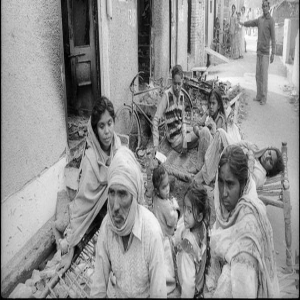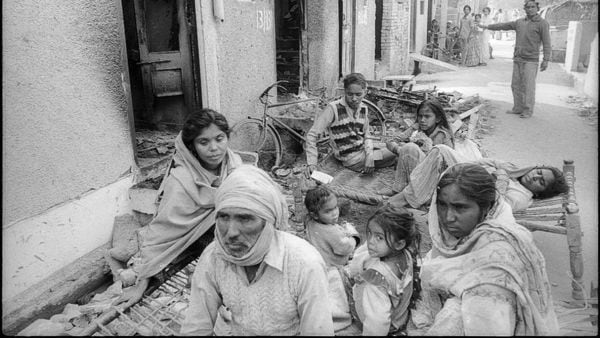
.png) Joseph Maliakan
Joseph Maliakan

Forty years after the Sikh genocide in India in 1984 following the assassination of Prime Minister Indira Gandhi by two of her armed Sikh bodyguards, the agony of the Sikh community around the world is continuing. According to official figures, in Delhi alone, 2733 Sikhs were murdered in cold blood between November 1 and 4, 1984. Unofficial estimates say that more than 5000 Sikhs were murdered during the four days. During the period, frenzied mobs spread terror indulging in mass murders, rape, arson, looting, acid throwing and burning Sikhs with tyres around their necks.
Singer-actor Diljit Dosanjh, who plays a family man in the Netflix movie Jogi, which is set during the massacre, says that the '84 Sikh massacre should be described as genocide because it affected all of us. Directed by Ali Abbas Zafar, the film explores the agony and sorrow of the Sikh community in Delhi during the genocide. They are still living in agony.
Contrary to claims made by the then-ruling party leaders and even judges appointed to enquire into the massacre, eyewitness accounts prove that the killings, rapes, arson and lootings were planned and executed with military precision. Most of those killed were pulled out of their
homes, buses or trains, beaten up and burnt alive.
Many prominent Congress leaders of the time were involved in planning and executing the mass murders. Though commissions and committees which enquired into the conduct named many Congress leaders, very few have been prosecuted and convicted for the crimes they committed. Only one prominent Congress leader of the time, Sajjan Kumar, was sentenced to life imprisonment for his role in the killing of the Sikhs. Even he was convicted only in 2018, more than 30 years after the massacre.
One of the most frightening features of the massacre was the complicity of the police. The police participated by engaging in the murders, inciting people to seek vengeance and providing murderous mobs with weapons, kerosene and petrol to burn the Sikh bodies.
The survivors, even after 40 years, are yet to get justice. No policeman has been prosecuted, no cases have been registered for the hundreds of rapes that took place, and in the 2733 murders, officially admitted cases have been concluded only in the cases of 10 FIRs. Only 587 FIRs were filed with regard to the unprecedented violent incidents during those four fateful days. Of these, the police closed 241 cases without any investigation whatsoever for "lack of evidence."
In this context, the finding of the Nanawati Commission, which was the last to investigate the massacre, is very pertinent. The commission said: The attacks were made in a systematic manner and without much fear of the police, almost suggesting that they were assured that they would not be harmed while committing those acts and even thereafter. Male members of the Sikh community were taken out of their houses. They were beaten first and then burnt alive in a systematic manner. In some cases, tyres were put around their necks, and then they were set on fire by pouring kerosene or petrol over them. In some cases, white inflammable powder was thrown on them, which caught fire immediately.
This was a common pattern followed by the big mobs, which had played havoc in certain areas. The Sikh shops were identified, looted and then burnt. Thus, what initially started as an angry outburst became organised carnage. The commission further pointed out that without the backing of and help of influential and resourceful persons, killings of Sikhs so swiftly and in such large numbers could not have happened. Mobilising mobs and supplying them with weapons and inflammable material also required an organised effort.
However, so far, neither the Congress party nor the governments led by it have owned any responsibility for the Sikh genocide. Two weeks after the terrifying genocide and large-scale looting and burning of Sikh properties in the capital on November 19, at a rally to observe Indira Gandhi's birthday, Prime Minister Rajiv Gandhi said that when a big tree falls, the earth shakes, justifying the carnage the magnitude of which the pilot turned Prime Minister failed to understand.
In 2005, Prime Minister Manmohan Singh, while intervening in a discussion in the Parliament on the report of the Nanawati Commission, profusely apologised for the killing of the Sikhs in the aftermath of the assassination of Prime Minister Indira Gandhi. But he did not own the government's failure to protect the life and property at a time of grave crisis created by the assassination of the Prime Minister.
No cases were registered against any policeman for complicity or participation in the killings. The Kapoor Mittal committee investigated the role of the police in the 1984 genocide. The committee identified 72 officers who were negligent and recommended that 30 of them be dismissed. However, apart from setting up a few departmental enquiries, the government took no action to punish the guilty police officers. This reporter who reported the massacre from east Delhi, one of the worst affected areas, was a witness in some of the enquiries, which were actually a sham because everyone was exonerated. Some of them were even promoted and rewarded.
Commenting on the downright shoddy investigation by the police, Justice SN Dhingra in State v. Rana A Saroj, a trial that began 11 years after the genocide, remarked: the police investigation in each of the riot cases filed in the courts has been wanting in quality. The manner in which the trial of the riot cases has proceeded is unthinkable in any civilised country.
The Misra Commission, set up soon after the mass killings, only helped cover up the genocide. This reporter filed an affidavit before the commission describing what he witnessed during those fateful days, particularly the Trilokpuri carnage. First, the Secretary of the Commission called me to his chamber and asked why I had filed an affidavit when I was not affected, despite the fact I am one of the prime witnesses to the Sikh genocide.
Further, when I appeared before the Misra Commission, I was treated more like an accused than a witness. During cross-examination by the government advocate, I was charged with writing exaggerated reports at the instance of the Indian Express management led by Ramnath Goenka. In fact, after we (Rahul Bedi and I) filed our report on the Trilokpuri massacre, I was questioned by four senior editors about the authenticity of the report. They could not at that time believe that such a large-scale massacre could take place in the capital of the country. Misra did not only not defend me, but I must also reveal at this distant point in time, rejected my affidavit as "unreliable."
In fact, the inordinate delay in the trial of the rioters had legitimised violence and criminals through the instrumentalities of the state to stifle the investigation. It cannot be relied upon to dispense justice uniformly to the people. It amounts to a total wiping out of the law. Justice Dingra added that the police investigations were absolutely casual, perfunctory, and faulty.
The Mittal report noted that the police had quietly collected and disposed of the bodies of those whom the mobs were unable to completely burn. During the killings, more than 30 Sikh women were kidnapped from Trilokpuri and held captive at the Chilla village for days. No investigation was conducted into the matter, and no compensation was paid to the women.
As for relief and rehabilitation of the survivors of the genocide, the less said, the better. More than 600 widows who had lost everything were dumped in Tilak Vihar to fend for themselves on a "princely pension" of Rs 500 a month. The single mothers found it impossible to bring up their children properly, and many became addicted to drugs and are uneducated and jobless. They are destined to suffer till the end of their lives.
The totally communal mindset of the police in Delhi has not changed a bit, as proven by the fact that the police aided and abetted the anti-Muslim violence in northeast Delhi in February 2020, in which 40 Muslims and 13 Hindus were killed.